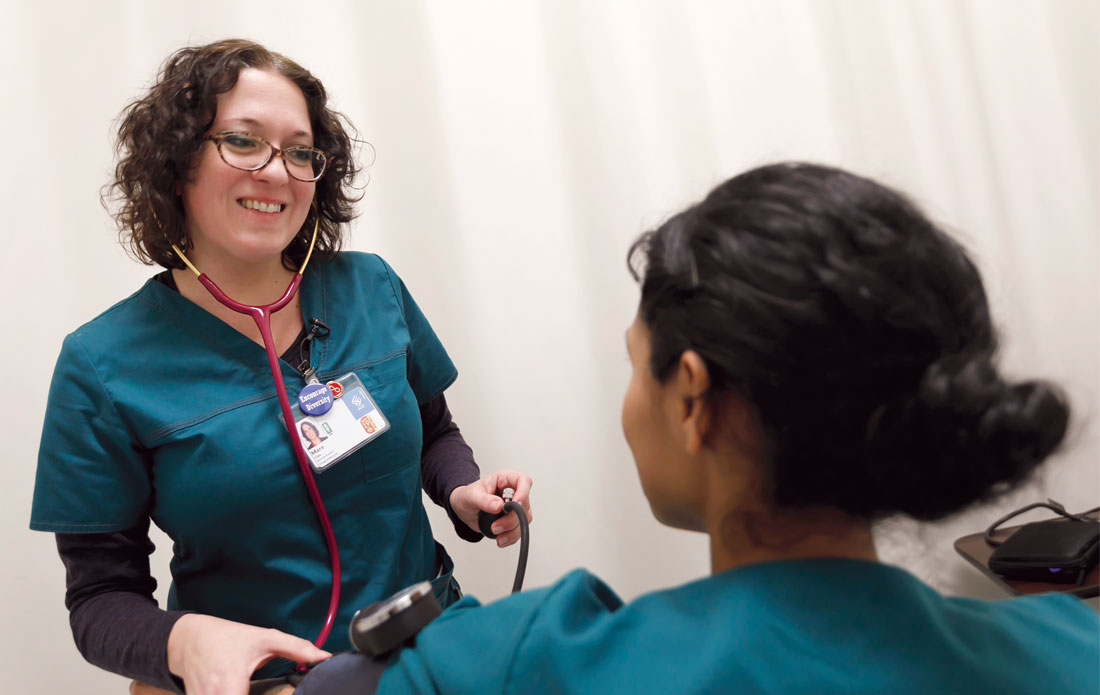Navigating the health care system can be intimidating for many. Challenges such as poverty and homelessness, cultural and language barriers, and rural or social isolation often have negative health impacts and can make it difficult to access care.
That’s where OHSU’s Interprofessional Care Access Network, also known as I-CAN, comes in. The program partners OHSU students from all areas of health care — nursing, dentistry, medicine and other fields — with local agencies to help meet the needs of disadvantaged communities.
“Participation in I-CAN can change student perspectives on health care delivery,” Heather Voss, PhD, RN, associate professor of clinical nursing in Ashland and program co-manager for I-CAN, said. “They turn out to be different professionals by working with members of underserved communities and understanding systemic issues such as poverty. It changes how students perceive their practice.”
More than 1,600 OHSU students have participated in the program since it began in 2013. Currently, there are sites in communities across Oregon, including Portland, Monmouth, Klamath Falls, West Medford and La Grande. In small teams under the supervision of nursing faculty, students develop supportive relationships with clients to help them achieve health-related goals, such as making and attending an appointment with a health care provider or understanding which medications to take and when.
Learn how OHSU and its students responded to changes brought on by the COVID-19 pandemic.
“I-CAN is about helping community members to be self-sufficient, and helping them break down or address barriers to health and health care,” Peggy Wros, PhD, RN, and program director for I-CAN, said. “Students, in turn, are meeting people where they are at and walking in their shoes. It’s essential learning for our students.”
In 2020 the COVID-19 pandemic has brought a whole new set of challenges to communities throughout Oregon — many people have lost their jobs, are at risk of losing their homes, or are unable to afford food. Because of physical distancing practices, the I-CAN program shifted from in-home visits to connecting via phone and video calls during spring term. Derek Langfeldt, a senior nursing student in the accelerated baccalaureate program on the Ashland campus, was able to educate patients on the latest information about the coronavirus, and provide some comfort in a time of uncertainty.
“Clients learn to trust the students — they know we are there to hear them out and connect them with the right resources,” Langfeldt said.
“People have different priorities, goals and limitations in their life that you may not see when you’re in a hospital setting. It’s not cut and dried; it’s complicated. It’s been eye-opening.”
Derek Langfeldt, nursing student
I-CAN has demonstrated remarkable success in improving health outcomes. More than half of their clients increased their medication literacy, meaning they understand how to properly use their prescribed medications. Half of their clients also increased their ability to manage their chronic disease, while many improved their ability to manage chronic pain, manage medications and secure safer or more stable housing. Participation has also led to fewer emergency room visits, emergency calls and hospitalizations — resulting in cost savings for communities and payers.
The program has also seen students improve their team-based decision-making, knowledge of health disparities and attitudes toward health disparities — while improving the health in communities across the state.
“You see the pre-hospital side of things, what patients are going through,” Langfeldt said. “People have different priorities, goals and limitations in their life that you may not see when you’re in a hospital setting. It’s not cut and dried; it’s complicated. It’s been eye-opening.”

